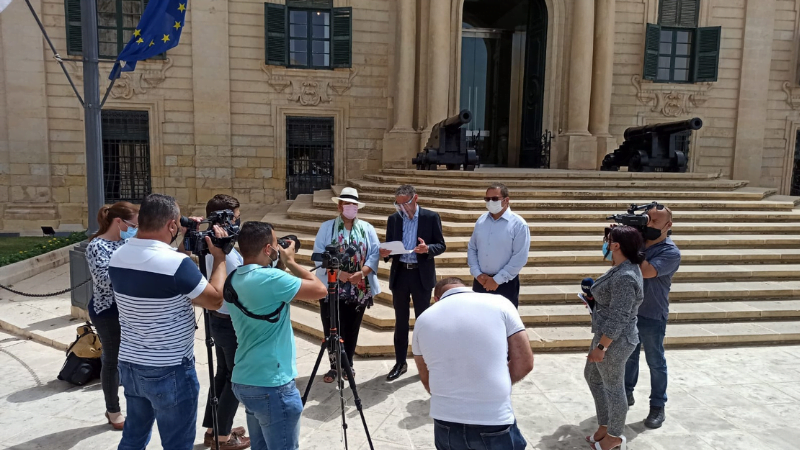Civil society NGO Repubblika called for an interim government that would be tasked with steering the country towards transparent elections that would be held next year as well as ensuring that the Financial Action Task Force’s demands are met.
Speaking at a press conference on Monday, Repubblika president Robert Aquilina said such a government would include “skilled people whose integrity and ability are widely recognised” and that such a government would have a limited 12-month mandate to fulfil.
“Let’s speak the truth: our country is in a crisis. We must understand that we cannot accept allowing those who led us into this precarious situation to lead us out of it,” Aquilina said.
Aquilina was referring to the FATF’s decision to greylist Malta, a damning indictment of the country’s ability to combat money laundering and counter-terrorism financing.
He stressed that one of the FATF’s key grievances with Malta was the lack of effective implementation of legislative frameworks against money laundering and counter-terrorism financing, along with the fact that no high level prosecutions were made at government level.
In the press conference, Aquilina insisted that Robert Abela’s government is continuing to “give political and institutional shelter to both political and non-political criminals”, further continuing the cycle of impunity.
He was referring to several former or current prominent members of the Labour government who not only did not face prosecution for their roles but have largely failed to face any criminal consequences for corruption, highlighting especially how former finance minister Edward Scicluna now runs Malta’s Central bank.
Repubblika pointed out that this was further exacerbated by the complete silence from Malta’s Central Bank and the Malta Financial Services Authority (MFSA) after the greylisting further indicates the lack of autonomy from these institutions.
One of the organisation’s main points was to call for the resignation across every executive board within the Central Bank, the MFSA and the Financial Intelligence Analysis Unit (FIAU).
“The corrupt politicians who dirtied Malta’s reputation are still enjoying total impunity,” Aquilina said.
“The one who was supposed to watch over the country’s finances but instead was complacent – or possibly even complicit – when his friends were robbing us has been given the role of governor of our Central Bank. This role was given to him by none other than Robert Abela,” Aquilina added.
The interim government in Repubblika’s proposal, referred to as a ‘national solidarity government’, would be one supported by both sides of the House and include a number of technocrats.
A prime minister would also have to be selected and tasked with leading the government through its 12months before an election in 2022.
The national solidarity government would first and foremost be responsible for seeing through all of the demands imposed by the FATF in its decision to greylist Malta, especially in terms of holding members of the present administration accountable.
In other words, a crucial role of the national solidarity government would be to bolster the police force and push it towards “bringing persons who are either involved in politics or others who were associated with politicians who are enjoying impunity to justice”.
“This government would also have to rebuild and strengthen the checks and balances of our country while adopting a politics of accountability, while ensuring that principles of rule of law and democracy are truly upheld,” Aquilina said.
Another role Repubblika’s proposed interim government would have to fill is to ensure that the upcoming elections would be held “in a truly democratic spirit”.
“For example, for a fair election to occur, we would have to undergo a process that ensures that state broadcasting media are not taken over by political parties but genuinely serve as public broadcasting,” Repubblika’s president said.
Aquilina called out the government on its “pathetic attempts to make people believe that they are only responsible for what occurred from January 2020 onward”, referring to the prime minister’s press conference last week right after news reports revealed Malta’s greylisting.
“The time for empty slogans is over. We have an ugly reality in front of us,” he said.
“Corruption and institutionalised criminality are not just immoral; they also impoverish our reputation and our quality of life,” he added.














Labour has been pumping the brakes so hard for the last 8 years that now when they really need them they are facing one hell of a ride.
Here is an opportunity for George Vells to put in practice his “National Unity.”
He could call it a National Unity Government.
I admit, I do not personally like the idea of a technocratic government, because it would be the definitive proof that our democratic process is failing, but in the circumstances it would be better than the present Mafia government, which is also dictatorial, and which is killing our democracy.